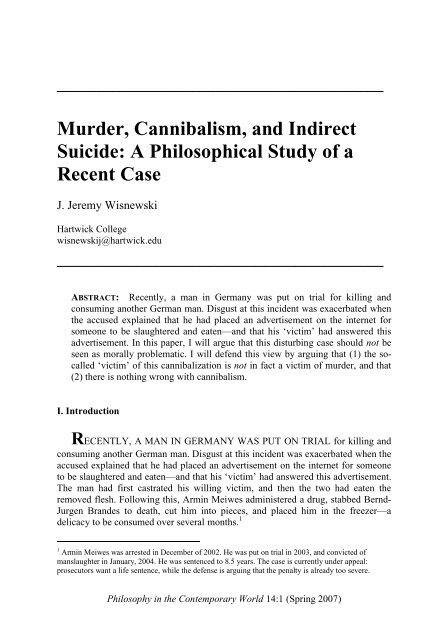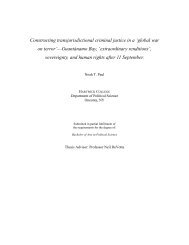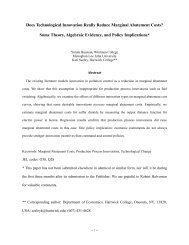Murder, Cannibalism, and Indirect Suicide - Hartwick College
Murder, Cannibalism, and Indirect Suicide - Hartwick College
Murder, Cannibalism, and Indirect Suicide - Hartwick College
Create successful ePaper yourself
Turn your PDF publications into a flip-book with our unique Google optimized e-Paper software.
_________________________________<br />
<strong>Murder</strong>, <strong>Cannibalism</strong>, <strong>and</strong> <strong>Indirect</strong><br />
<strong>Suicide</strong>: A Philosophical Study of a<br />
Recent Case<br />
J. Jeremy Wisnewski<br />
<strong>Hartwick</strong> <strong>College</strong><br />
wisnewskij@hartwick.edu<br />
_________________________________<br />
ABSTRACT: Recently, a man in Germany was put on trial for killing <strong>and</strong><br />
consuming another German man. Disgust at this incident was exacerbated when<br />
the accused explained that he had placed an advertisement on the internet for<br />
someone to be slaughtered <strong>and</strong> eaten—<strong>and</strong> that his ‘victim’ had answered this<br />
advertisement. In this paper, I will argue that this disturbing case should not be<br />
seen as morally problematic. I will defend this view by arguing that (1) the socalled<br />
‘victim’ of this cannibalization is not in fact a victim of murder, <strong>and</strong> that<br />
(2) there is nothing wrong with cannibalism.<br />
I. Introduction<br />
RECENTLY, A MAN IN GERMANY WAS PUT ON TRIAL for killing <strong>and</strong><br />
consuming another German man. Disgust at this incident was exacerbated when the<br />
accused explained that he had placed an advertisement on the internet for someone<br />
to be slaughtered <strong>and</strong> eaten—<strong>and</strong> that his ‘victim’ had answered this advertisement.<br />
The man had first castrated his willing victim, <strong>and</strong> then the two had eaten the<br />
removed flesh. Following this, Armin Meiwes administered a drug, stabbed Bernd-<br />
Jurgen Br<strong>and</strong>es to death, cut him into pieces, <strong>and</strong> placed him in the freezer—a<br />
delicacy to be consumed over several months. 1<br />
1 Armin Meiwes was arrested in December of 2002. He was put on trial in 2003, <strong>and</strong> convicted of<br />
manslaughter in January, 2004. He was sentenced to 8.5 years. The case is currently under appeal:<br />
prosecutors want a life sentence, while the defense is arguing that the penalty is already too severe.<br />
Philosophy in the Contemporary World 14:1 (Spring 2007)
12 J. Jeremy Wisnewski<br />
In this paper, I will argue that this disturbing case should not be seen as morally<br />
problematic. I will defend this view by arguing that 1) the so-called ‘victim’ of this<br />
cannibalization is not in fact a victim of murder, <strong>and</strong> that 2) there is nothing wrong<br />
with cannibalism.<br />
II. <strong>Murder</strong> <strong>and</strong> <strong>Suicide</strong><br />
In this section, I will argue that murder <strong>and</strong> suicide are incompatible. I will base<br />
this claim on the view that consent can be morally transformative—that the<br />
presence of consent is capable of altering the nature of a class of actions. I will<br />
begin by considering some common linguistic intuitions about when the term<br />
‘murder’ <strong>and</strong> the term ‘suicide’ appropriately apply to specific cases. I do not,<br />
however, endorse the view that the meaning of these concepts can be determined<br />
simply by mining our linguistic intuitions. Our intuitions are, like everything else,<br />
subject to criticism. Nevertheless, one must begin somewhere.<br />
Perhaps the most famous definition of suicide if found in Durkheim’s work<br />
bearing the same name. Durkheim claims that “suicide is applied to all cases of<br />
death resulting directly or indirectly from a positive or negative act of the victim<br />
himself, which he knows will produce this result” (Durkheim, 1951, 44). The<br />
problem with this definition is obvious enough: it includes too much. Enlisting in<br />
the armed forces, smoking, eating meat, <strong>and</strong> simply existing will eventually<br />
‘produce the result’ of death. We thus require a more restrictive definition.<br />
I propose the following: Suicidal behavior is intentionally engaging in actions<br />
that will lead to your demise because they will lead to your demise. When said<br />
behavior results in death, we have a suicide. On this view, suicide has two<br />
conditions: 1) the action in question must by known to result in death, or at least to<br />
increase the likelihood of death by a significant degree, <strong>and</strong> 2) the fact that the<br />
behavior increases the likelihood of death must be the reason for doing it. 2<br />
Eating meat (under this definition) is thus not suicide, even if one knows such<br />
eating will result in one’s death. Eating meat can only be suicide if the reason one<br />
eats meat is that one wants to die. This crucial intentional component separates the<br />
youth who feels obligated to defend his country even at the expense of his life from<br />
the man who puts a bullet into his brain because he wants to shuffle off this mortal<br />
coil.<br />
This intentional component—a component constitutive of suicide—enables us to<br />
see an important difference between murder <strong>and</strong> suicide—a difference that warrants<br />
the claim that suicide is not murder, <strong>and</strong> this because it is logically impossible to<br />
murder yourself. To establish this, we need to generate an adequate definition of<br />
murder. Let us begin by noting that the term ‘murder’ is a morally-loaded one. It<br />
involves a judgment of moral worth. A murder is, by definition, a killing that is<br />
wrong.<br />
Obviously, however, this initial definition will not get us very far. There are<br />
many cases of wrongful killing that do not constitute murder. We distinguish, for<br />
instance, murder <strong>and</strong> manslaughter. In many cases, this distinction marks the<br />
2 This account of suicide is also found in Graber. For an excellent discussion of some of the problems of<br />
this definition, as well as other potential definitions, see Cholbi.
<strong>Murder</strong>, <strong>Cannibalism</strong>, <strong>and</strong> <strong>Indirect</strong> <strong>Suicide</strong> 13<br />
difference between an intentional act <strong>and</strong> an unintentional one: accidentally killing<br />
someone with my car is not morally identical to stabbing that person with the aim of<br />
ending his life.<br />
A distinction between the intentional <strong>and</strong> the non-intentional, however, is not<br />
enough. Clearly, murder involves an intentional component: if my negligence<br />
results in your death, I am in an important sense responsible for your death. It does<br />
not follow from this, however, that I have murdered you. In addition to the<br />
intentionality requirement, the notion of murder seems to require (at least prima<br />
facie) that the victim of a murder be human. 3 This is, I take it, why factory-farmers<br />
are not regarded as mass murderers. 4<br />
If our intuitions thus far can be trusted, murder is the intentional wrongful<br />
killing of a human being. There is a third condition that can be added to this<br />
definition. We might call this ‘the condition of no prior consent’: a murder requires<br />
that the victim of the murder has not given prior consent to his execution.<br />
The force of this condition can perhaps be brought out as follows: If I pull the<br />
plug of a life support mechanism, what will determine whether or not I have<br />
committed a murder will be, in part, whether or not the patient in question would<br />
have consented to having the plug pulled. Of course, my intentions are also relevant<br />
to assessing the morality of the action—but how much so is an open question. Let<br />
us suppose that my aim is to end the suffering of the patient. If the patient would<br />
have consented, then my action is not murder. 5<br />
The force of this example is to bring out the moral relevance of consent for a<br />
number of cases. Consent marks the difference between sex <strong>and</strong> rape, surgery <strong>and</strong><br />
battery, torture <strong>and</strong> masochistic pleasure, <strong>and</strong>, I am suggesting, murder <strong>and</strong> assisted<br />
suicide. The condition of no prior consent specifies that a murder occurs (<strong>and</strong> not an<br />
assisted suicide) only when the person killed would not consent to the killing.<br />
If a violation of autonomy is a constitutive part of the wrongfulness of murder,<br />
then (to use Alan Wertheimer’s expression) consent can be morally transformative<br />
(Wertheimer 2003; see also Wertheimer 2000). Because the absence of consent is<br />
necessary for murder, my giving consent can transform an impermissible act into a<br />
permissible one. There is nothing magical about this. There is a class of morally<br />
wrong actions that are morally wrong just insofar as they violate an agent’s<br />
autonomy. If said agent gives legitimate consent, a violation no longer occurs. Thus,<br />
the very thing that made the action impermissible is no longer present.<br />
It does not follow from this that killing someone who has given consent is<br />
always morally permissible. It does follow that such a killing would not be murder.<br />
There are many things that might make a killing impermissible: it might prevent me<br />
from carrying out particular duties to others, it might leave my family destitute, it<br />
3 This is one reason for the controversy surrounding fetal homicide legislation. If we can charge someone<br />
with murder for the killing of a fetus (as in the recent double homicide case in California), this seems to<br />
pave the way for anti-abortion legislation, as it relies on the view that the fetus is a human being (or so<br />
some opponents of the legislation have argued).<br />
4 It does not follow from this that factory-farming is morally acceptable. Even if we cannot murder an<br />
animal, it does not follow that the killing is permissible.<br />
5 Similar arguments are sometimes used to defend the death penalty. Famously, Kant claims that the<br />
death penalty can be justly imposed because the agent to be put to death has given tacit consent to this<br />
punishment by committing crimes punishable by death.
14 J. Jeremy Wisnewski<br />
might prevent me (if I kill another) from living a productive life. These moral<br />
wrongs, however, are independent of claims about murder: they are the moral<br />
wrongs that are (sometimes) associated with death simpliciter. What is unique to<br />
murder—what makes it particularly wrong (or so I am suggesting)—is that it<br />
violates the autonomy of an agent.<br />
If what I have said so far is correct, it follows that in any instance where we take<br />
a life with the consent of the person whose life we take, this action cannot be called<br />
murder (even if our action is wrong for other reasons). The condition of no prior<br />
consent also enables us to sharply distinguish murder from suicide. Because suicide<br />
involves willingly taking your own life because you want your life to end, it cannot<br />
be murder. In suicide, consent is always present. In murder, it never is. The<br />
difference between murder <strong>and</strong> suicide is a difference in consent.<br />
The distinction between murder <strong>and</strong> suicide just drawn allows us to broaden<br />
what we typically count as suicide in two useful ways. Recall that suicidal behavior<br />
is engaging in behavior that will lead to one’s own demise because it will lead to<br />
one’s demise. A suicide is when such behavior successfully achieves its end. Now<br />
consider the following sibling concepts.<br />
1) Hypothetical <strong>Suicide</strong>: a hypothetical suicide is when one acknowledges those<br />
conditions under which one would no longer want to live. If I specify, in a<br />
contract for instance, that I do not want to be kept alive by life support, I am<br />
specifying the conditions under which I would engage in behavior that would<br />
lead to my death because it would lead to my death.<br />
2) <strong>Indirect</strong> <strong>Suicide</strong>: an indirect suicide is when someone else enables me to take<br />
my own life because I no longer want to live. 6<br />
Obviously, there are many conditions that might be specified under hypothetical<br />
suicide that would require indirect suicide: if I specify that I do not want to live on<br />
life support, <strong>and</strong> I find myself living on life support, there is a good chance that I<br />
will be unable to end my own life. In this case, an intervention seems justified<br />
(provided there is little hope of recovery, etc). Given that I have specified that these<br />
are the conditions under which I would end my own life, <strong>and</strong> that you are carrying<br />
out my wishes for me because they are my wishes, we can reasonably call this an<br />
instance of suicide—albeit one that is indirect.<br />
This case is relatively close to cases where the wishes of the deceased are<br />
carried out simply because they are the wishes of the deceased. When we provide<br />
funeral services that meet the particular wishes of our loved ones, we act as the<br />
agents of these loved ones. What justifies our action is precisely that, if the deceased<br />
were alive to plan his own funeral, he would have done it just this way. Similarly<br />
with indirect suicide: when we enable someone to end her life because she wants<br />
6 ‘Assisted suicide’ might work here too, given the appropriate provisos. The trouble with the notion of<br />
assisted suicide is that it is frequently tied to euthanasia—to ending someone’s life because of the pain<br />
they are experiencing. <strong>Indirect</strong> suicide is meant to be a broader notion. It is meant to include ending<br />
someone’s life for any reason, provided the person wants his life to end. In this respect, it is not a mercy<br />
killing. The phrase ‘assisted suicide’ has this connotation. I have thus chosen ‘indirect suicide’ instead.
<strong>Murder</strong>, <strong>Cannibalism</strong>, <strong>and</strong> <strong>Indirect</strong> <strong>Suicide</strong> 15<br />
her life to end, we act as the agent of another. We are the means through which her<br />
will is carried out.<br />
It is important to recognize that our reasons for facilitating a suicide might be<br />
over-determined. I might want to end your life because you want it to end in<br />
addition to wanting to end your life because it pains me to see you suffer, I’ll get an<br />
inheritance, or whatever. There can be numerous incentives to facilitate your<br />
demise. It is absolutely crucial, however, that the acting agent acts with the consent<br />
of the person on behalf of whom he acts.<br />
The difference between suicide <strong>and</strong> murder, then, is the consent of the agent<br />
killed. There are two important cautionary notes, however, that need to be added to<br />
the analysis thus far given: First, to specify that an act is indirect suicide (<strong>and</strong> not<br />
murder) does not definitively show that the act was morally permissible. <strong>Suicide</strong> is,<br />
after all, sometimes morally reprehensible. Nevertheless, I contend, suicide is much<br />
easier to justify than murder.<br />
Second, the entire analysis thus far has hinged on an unanalyzed notion of<br />
consent. While it is not my charge to provide a complete account of consent, I will<br />
suggest two legitimacy conditions for a consensual act. Consent that is produced<br />
through deception, coercion, or misinformation is not legitimate consent. 7<br />
Moreover, to speak of legitimate consent presupposes that the person consenting is<br />
competent to consent (they are not mentally impaired, for example). Thus, for<br />
consent to be legitimate, it must be informed, <strong>and</strong> it must be the consent of a<br />
competent agent. 8<br />
III. A Willing Victim: <strong>Indirect</strong> suicide or murder?<br />
If what I have been claiming is correct, we are in a better position to asses the<br />
action of Armin Meiwes. First, we should point out that Bernd-Jurgen Br<strong>and</strong>es (the<br />
killed <strong>and</strong> cannibalized) answered an ad that had been placed on the internet. 9 He<br />
lived in Berlin (a considerable distance from Meiwes), <strong>and</strong> he was interviewed<br />
before consumed. There is thus considerable evidence that Br<strong>and</strong>es was a willing<br />
participant in his own execution <strong>and</strong> cannibalization. Provided that we have the<br />
consent of Br<strong>and</strong>es, then, we cannot say that Br<strong>and</strong>es was murdered. The condition<br />
of no prior consent has not been met. 10<br />
It is also worthy of notice that Br<strong>and</strong>es’s actions fit the above definition of<br />
suicide perfectly. A suicide is intentionally engaging in action that will lead to one’s<br />
own death because it will lead to one’s death. Br<strong>and</strong>es answered the ad placed by<br />
Meiwes with knowledge of what was to become of him. Br<strong>and</strong>es reported that he<br />
7 To put it otherwise: consent means informed consent.<br />
8 There are surely other legitimacy conditions. Feinberg (for example) suggests that consent requires<br />
legitimate alternatives. This strikes me as correct. I limit myself to the above two conditions because they<br />
here prove most relevant.<br />
9 The following information on the Meiwes case has been widely reported. I have relied primarily on the<br />
BBC for my information. See www.bbc.co.uk for the relevant articles.<br />
10 Of course, it does not follow from the fact that Br<strong>and</strong>es consented to be killed that there was nothing<br />
morally reprehensible about his execution. <strong>Suicide</strong> is, on occasion, morally reprehensible (when one<br />
ab<strong>and</strong>ons those dependent on one, for example, or otherwise skirts one’s duties). Br<strong>and</strong>es did not have<br />
any dependents, however. Moreover, he does not appear to have had any substantial obligations.
16 J. Jeremy Wisnewski<br />
had long fantasized about being killed <strong>and</strong> eaten by another human being. Br<strong>and</strong>es<br />
thus answered the ad to fulfill a fantasy, the content of which involved his own<br />
death. This course of action, I am suggesting, is completely compatible with the<br />
definition of suicide just offered: Br<strong>and</strong>es answered the ad (an action that would<br />
lead to his own death) because he wanted to die. It is irrelevant that his wish to die<br />
was part of a fantasy.<br />
Meiwes’s actions here fit the definition of indirect suicide, but not quite as<br />
easily. For Meiwes’s actions to count as facilitating an indirect suicide, we must<br />
hold that Meiwes killed Br<strong>and</strong>es because Br<strong>and</strong>es wanted to be killed. Obviously,<br />
this was not the only reason. After all, Meiwes put out an ad well before he ever<br />
knew Br<strong>and</strong>es. Recall, however, that incentives for indirect suicide can be overdetermined.<br />
Even if Meiwes had other incentives (wish fulfillment, for example),<br />
his action can still fall under the definition of indirect suicide provided that the<br />
following counter-factual is true: he would not have killed Br<strong>and</strong>es if Br<strong>and</strong>es had<br />
not wanted to be killed.<br />
There is no proof that this counterfactual is true, but there is evidence to suggest<br />
that it is. Meiwes did not simply find a victim r<strong>and</strong>omly. He called for volunteers.<br />
This suggests that it was important to him that he had a willing victim (if you will<br />
permit me what might be an oxymoron). It has even been reported that his first<br />
partner was released from bondage moments before his execution because the<br />
partner decided that he did not want to die. Presumably, if Br<strong>and</strong>es had changed his<br />
mind at any point during his interaction with Meiwes, Meiwes would not have<br />
carried his fantasy through.<br />
This is by no means proof that the actions of Meiwes were morally acceptable—<br />
but it does tell us where we need to look to determine whether or not those actions<br />
were permissible. First, we need to determine whether or not actual consent was<br />
given by Br<strong>and</strong>es—consent that meets the legitimacy conditions specified above.<br />
Second, we need to determine whether or not Meiwes’s actions depended on this<br />
consent (i.e. we need to know whether or not Br<strong>and</strong>es’s consent was a necessary<br />
prerequisite for Meiwes). If we could discover that it was, we would then know that<br />
the action was indirect suicide, not murder. If Br<strong>and</strong>es’s death did not result in an<br />
inability to fulfill his duties, one could plausibly argue for the moral permissibility<br />
of his suicide.<br />
I have already given sufficient reason to think that Meiwes’s actions were<br />
dependent on Br<strong>and</strong>es’s consent. There is also reason to think that Br<strong>and</strong>es did not<br />
ab<strong>and</strong>on any duties to other in accepting Meiwes’s offer (he was single, not in debt,<br />
etc). The most significant challenge, then, lies in establishing that Br<strong>and</strong>es gave<br />
actual, legitimate consent. Despite the fact that the entire episode was video-taped,<br />
that Br<strong>and</strong>es traveled a good distance to participate in this fantasy, <strong>and</strong> that he was<br />
interviewed before his execution, there are still those who will object that his<br />
consent was not legitimate. I would like to quickly deal with one such objection.<br />
The quick argument against the view that Br<strong>and</strong>es consented runs as follows:<br />
<strong>Cannibalism</strong>/suicide are manifestations of mental illness. The mentally ill are not<br />
competent. Thus, because competence is a prerequisite for legitimate consent,<br />
Br<strong>and</strong>es did not consent.
<strong>Murder</strong>, <strong>Cannibalism</strong>, <strong>and</strong> <strong>Indirect</strong> <strong>Suicide</strong> 17<br />
There are two responses I would like to make to this objection. First, it begs the<br />
question. Second, it relies on a politically-loaded notion of mental illness. If one<br />
assumes that it is impossible to consent to cannibalism, one assumes that<br />
cannibalism is in some way an illegitimate action—it is immoral, or irrational, or<br />
vicious. But that is the very question that is here at issue. Thus, to assume that one<br />
cannot consent to cannibalism is to beg the question. To justify the argument, one<br />
must establish that cannibalism does in fact stem from mental illness. This, I<br />
suggest, cannot be done.<br />
One way of specifying illness is in terms of physiological states. 11 To treat an<br />
illness is to attempt to change the physiological conditions that constitute it. If we<br />
specify diseases in this way, it becomes very difficult to call cannibalism a disease.<br />
<strong>Cannibalism</strong> is a behavior, not a physiological state. Thus, it is a category mistake<br />
to call cannibalism a disease—this is simply to conflate disease <strong>and</strong> symptom.<br />
Moreover, there is no evidence to suggest that cannibalism results from any<br />
abnormal physiological condition. This would make cannibalism a symptom<br />
without a disease—a position that is close enough to absurdity to reject out of h<strong>and</strong>.<br />
Of course, my objector might concede this <strong>and</strong> go on to claim that ‘mental<br />
health’ is a statistical notion. When there are no underlying physiological conditions<br />
under consideration, the term ‘mental illness’ picks out regularity/normalcy, <strong>and</strong> no<br />
more. This sounds exactly right—but it is morally pointless. It is not normal to eat<br />
people—much as it is not normal to defend cannibalism—but it hardly follows from<br />
this that doing either is wrong.<br />
There are other arguments against cannibalism (which I will consider in the<br />
following section). The argument that consent to cannibalism is impossible (for<br />
reasons of mental health), however, fails. Given that it fails, we have reason to think<br />
that Br<strong>and</strong>es did give actual, legitimate consent to Meiwes, <strong>and</strong> hence that he was<br />
not murdered, but willingly participated in his own execution. 12<br />
IV. But he ate him…<br />
Even if the action in question was an instance of indirect suicide, one might still<br />
argue that the entire scenario was morally reprehensible, as it was designed for the<br />
11 The most famous advocate of this model of disease is certainly Thomas Szasz. However, I think this<br />
picture of disease is a fairly common <strong>and</strong> intuitive one.<br />
12 I think that other objections to the possibility of consenting to be killed <strong>and</strong> cannibalized face the same<br />
problems: they are question-begging. One might argue that it is logically impossible to consent to be<br />
killed, for example, in order to show that Br<strong>and</strong>es’ consent was not legitimate. One might begin by<br />
noting that there are things to which one cannot consent (i.e. slavery), <strong>and</strong> then argue that being killed is<br />
among these. The structure of such an argument is clear. I simply deny, however, that such consent is<br />
impossible—there are simply too many counter-examples.<br />
I should also note that I think objections from the tradition of virtue ethics suffer the same type of<br />
flaw as this objection. Appeals to human flourishing, as useful as these can be, by no means establish that<br />
cannibalism (or consent to cannibalism) is morally impermissible. To establish this, one must first<br />
establish a particular picture of human flourishing, then establish that said picture cannot allow<br />
cannibalistic practices. To my knowledge, this has not been done—<strong>and</strong> the task seems prohibitively<br />
difficult (think about how contentious every vision of human arête has thus far been). Until we can come<br />
up with a robust, defensible picture of human flourishing, then, the virtue theorist will have to attempt<br />
other forms of objection: she cannot simply insist that eating people is wrong (at least if she does not<br />
want to beg the question).
18 J. Jeremy Wisnewski<br />
purpose of consuming human flesh. I do not find this compelling, if only because it<br />
relies on an intuition without determining whether or not the intuition has any<br />
rational basis.<br />
There are several arguments one can offer in defense of the cannibalism<br />
prohibition, most of which are not very good. I will consider three here, arguing that<br />
the one effective argument does not demonstrate that Meiwes’s cannibalism was<br />
morally impermissible.<br />
1. Argument from Consequences (it will kill you)<br />
There has recently been speculation about the relation between cannibalistic<br />
practices <strong>and</strong> a disease known as Kuru. 13 This is a disease similar to Creutzfeldt-<br />
Jakob Disease. 14 A popular view now seems to be that the consumption of human<br />
flesh is a cause of this disease. If this is true, it seems, we have a reason not to<br />
consume human flesh: namely, it will kill us.<br />
There are two things I want to say about this argument: first, it relies on an<br />
empirical thesis the evidence for which is not very substantial. To be explicit: there<br />
is evidence, but more research needs to be done to substantiate the postulated link<br />
between cannibalism <strong>and</strong> Kuru. Because Creutzfeldt-Jakob Disease occurs<br />
spontaneously at a rate of 1/1,000,000 per year 15 , it is possible that outbreaks of<br />
Kuru in Papua New Guinea were caused by the consumption of spontaneously<br />
infected CJD or Kuru victims. If this is correct, cannibalism itself is not the cause of<br />
Kuru. Rather, Kuru is caused (like Mad Cow Disease) by eating those infected with<br />
warped prion proteins—proteins which might have occurred spontaneously.<br />
But ethics need not wait on empirical science. Let us assume that there is a<br />
definitive link between cannibalism <strong>and</strong> this debilitating disease. It does not follow<br />
from this that it is wrong to consume human flesh. This conclusion would follow<br />
only if engaging in self-destructive behavior were also morally wrong. Most of us<br />
do not think it is morally wrong to eat fatty foods, to smoke cigarettes, to sun bathe,<br />
or to drink alcohol. But all of these activities can lead to disease. In fact, the<br />
probability of some of these activities leading to disease is (I speculate) greater than<br />
the probability of cannibalistic practices doing so. Given that it is not generally<br />
morally reprehensible to engage in life-shortening activity, the possibility that one<br />
can contract a brain disease from cannibalism does not establish its<br />
impermissibility.<br />
2. Argument from Consequences (it will upset people)<br />
Another approach to justifying the cannibalism prohibition is to note the<br />
negative effects a lift of this prohibition is likely to have on members of the society<br />
in which it is lifted. The sense of general disgust that pervaded that population, the<br />
13 See: “Brain Legacy of Ancient Cannibals” 10 April 2003, BBC News; or Prusiner 1997.<br />
14 Both diseases are caused by a warped prion protein.<br />
15 This figure is found in numerous places. This is the figure reported by the US Center for Disease<br />
Control <strong>and</strong> Prevention on the official CDC website at www.cdc.gov.
<strong>Murder</strong>, <strong>Cannibalism</strong>, <strong>and</strong> <strong>Indirect</strong> <strong>Suicide</strong> 19<br />
argument goes, <strong>and</strong> the moral outrage that accompanied this disgust, would far<br />
outweigh whatever meager culinary benefits might accrue by consuming the dead.<br />
This utilitarian argument suffers, I think, from a major flaw: it tacitly accepts a<br />
principle of conservativism that ought to be rejected in moral theory. If<br />
anthropophagic behavior resulted in moral outrage among the populace, that by<br />
itself is no indication of whether or not anthropophagic activity is immoral. People<br />
are sometimes outraged by perfectly innocuous things. Moreover, it seems clear that<br />
moral outrage is not a necessary result of cannibalism (there have, after all, been<br />
societies that routinely practiced cannibalism). If there is only a contingent relation<br />
between disgust <strong>and</strong> cannibalism, then, the utilitarian must rely on a principle of<br />
conservatism to justify the current cannibalism prohibition: because there will be a<br />
period of disgust (say) resulting from lifting the prohibition, we ought never to lift<br />
the prohibition.<br />
As a general moral principle, I think, the principle of conservation of customs<br />
(to give it a name) ought to be rejected. The meager fact that ab<strong>and</strong>oning a custom<br />
might cause some unhappiness is an insufficient reason for maintaining the<br />
custom—particularly if the morality of the custom is suspect. Upon reflection, I<br />
think, any good utilitarian would accept that the preservation of customs to avoid<br />
immediate unhappiness is not a defensible doctrine. To determine whether or not a<br />
custom can be defended requires looking beyond the immediate reactions of the<br />
population to the greater consequences of the ab<strong>and</strong>onment of said custom.<br />
Unfortunately, it is difficult (<strong>and</strong> perhaps impossible) to determine what our society<br />
might look like (<strong>and</strong> the amount of happiness that might be produced) if we<br />
routinely ate human flesh. In any case, because this is an open question, the<br />
argument from bad consequences fails to justify the cannibalism prohibition.<br />
3. Argument from Obligation to the Dead<br />
The final argument against cannibalism is an argument from obligation to the<br />
dead. On this view, cannibalism violates the general principle that we ought to<br />
respect the dead, <strong>and</strong> hence, cannibalism is morally impermissible.<br />
The first step in this argument involves establishing that there are in fact<br />
obligations to the dead. There are several lines of argument available here. First, one<br />
might claim (with Aristotle) that it is possible to benefit <strong>and</strong> harm the dead.<br />
Spreading harmful lies about the dead actually harms the dead person, <strong>and</strong> hence is<br />
morally impermissible. The consumption of a dead person would harm them in<br />
much the same way, the argument goes.<br />
There are two significant problems with this view: 1) it relies on a very<br />
controversial thesis (namely, that harm can befall the dead). Some philosophers<br />
have gone so far as to claim that death itself is not harm, let alone things that occur<br />
after death. 16 2) Even if we grant that harm can befall the dead, it is by no means<br />
clear that the consumption of the flesh of the dead would constitute a harm. When<br />
we speak of harming the dead, we frequently speak of harming the reputation or the<br />
memory of the dead. We do not generally think of what befalls the body as a harm.<br />
16 The most famous advocate of this view is certainly Epicurus.
20 J. Jeremy Wisnewski<br />
If decomposition counted as a harm to the dead, death would certainly be something<br />
to fear (pace Socrates).<br />
If we examine some examples of obligations to the dead, I think, it becomes<br />
clear that our obligations here center around agents, not around harmful states-ofaffairs.<br />
Consider these examples: giving someone a religious funeral service<br />
because they have requested it, donating a body to science, cremation, even the<br />
annual presence of Bentham’s corpse in the meeting room. Even those who reject<br />
the view that harm can befall the dead might accept that these are legitimate cases<br />
of obligation. The living specified her wishes concerning her mortal remains; we are<br />
obligated to carry out those wishes, not because a harm would befall the dead if we<br />
did not, but because they were the wishes of the deceased.<br />
I take this account of obligation to the dead to be a (roughly) Kantian one. We<br />
recognize in our agency a value-conferring capacity: we make ends meaningful by<br />
adopting them. One of the features of moral agency is to respect those ends adopted<br />
by other agents precisely because they have been so adopted. Respect for agency<br />
involves respecting the (morally-permissible) ends of agents; indeed, it even<br />
involves promoting those ends where possible. We have obligations to the dead<br />
because we had obligations to the ends of the living, <strong>and</strong> those ends live beyond the<br />
grave.<br />
But we are a far cry from showing that cannibalism disrespects the dead. Indeed,<br />
we can see why, in certain cases, anthropophagic behavior might be a sign of<br />
respect. If I have as an end to be consumed by someone who wants to consume me<br />
(as Br<strong>and</strong>es did), it might well be a sign of respect for my agency to carry out this<br />
action. Obviously, our ends are checked <strong>and</strong> limited by the ends of others: we are<br />
not required to do whatever the deceased want. But in cases where the deceased do<br />
not care if they are cannibalized (I do not care), or when the deceased actually want<br />
to be cannibalized, cannibalism does not violate our obligations to the dead. In<br />
carrying out their ends, we do not treat them merely as means.<br />
V. Conclusion<br />
In this paper, I have argued that the indirect suicide of Bernd-Jurgen Br<strong>and</strong>es<br />
was not murder—<strong>and</strong> indeed could not be murder. I have further argued that Armin<br />
Meiwes’s cannibalization of Br<strong>and</strong>es cannot be shown to be morally reprehensible.<br />
Too often we allow our disgust at some behavior to govern our thinking about it. I<br />
will not dispute that the consumption of flesh (from any animal) is disgusting. It<br />
does not follow from this, however, that said consumption is wrong. I have<br />
defended this controversial position in the name of argument over dogma, reason<br />
over taboo. I welcome rebuttal. 17<br />
17 I wish to thank the participants of the 2004 meeting of the Society for Philosophy in the Contemporary<br />
World, as well as an anonymous referee, for many helpful comments <strong>and</strong> criticisms of earlier versions of<br />
this paper.
<strong>Murder</strong>, <strong>Cannibalism</strong>, <strong>and</strong> <strong>Indirect</strong> <strong>Suicide</strong> 21<br />
Works Cited<br />
Cholbi, Michael Cholbi. 2004. “<strong>Suicide</strong>,” in The Stanford Encyclopedia of<br />
Philosophy.<br />
Durkheim, Emile. 1951. <strong>Suicide</strong>: A Study in Sociology, trans. John Spaulding <strong>and</strong><br />
George Simpson. New York: The Free Press.<br />
Graber, G. C. 1981. “The Rationality of <strong>Suicide</strong>” in S. Wallace <strong>and</strong> A. Eser, eds.,<br />
<strong>Suicide</strong> <strong>and</strong> Euthanasia: The Rights of Personhood. Knoxville: University of<br />
Tennessee Press.<br />
Prusiner, Stanley B. 1997. “Prion Diseases <strong>and</strong> the BSE Crisis” Science 278 (10<br />
October), 245-251.<br />
Szasz, Thomas. 1997. Insanity: The Idea <strong>and</strong> Its Consequences. Syracuse:<br />
Syracuse University Press.<br />
Wertheimer, Alan. 2004. Consent to Sexual Relations (Cambridge: Cambridge<br />
University Press.<br />
______. 2000. “What is Consent? And is it Important?” in Buffalo Criminal Law<br />
Review, 3, 557-583.

















